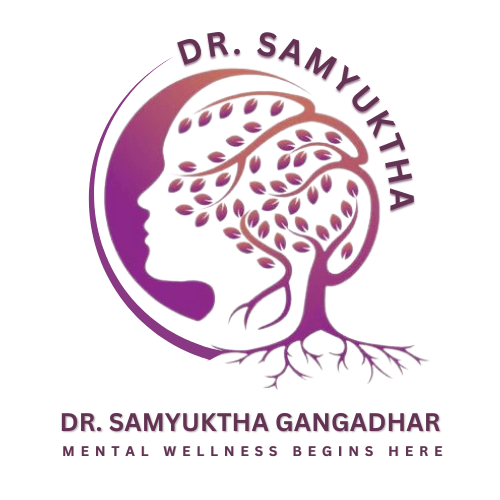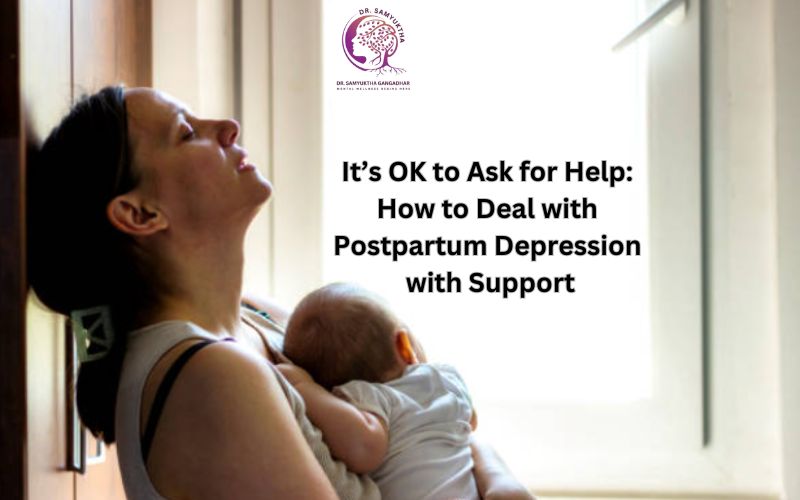Postpartum depression (PPD) is a significant mental health disorder that impacts numerous new mothers. After childbirth, it’s common to feel a mix of emotions, from joy and excitement to exhaustion and anxiety. However, for some women, these feelings intensify and lead to a more severe form of depression that requires attention and care. Understanding how to deal with postpartum depression is essential, as Postpartum Depression Symptoms can be overwhelming, impacting not just the mother but also her family and overall well-being. It’s important to acknowledge that you’re not alone, and asking for help is a vital part of the healing process.
At Pushpa Mind Care, Dr. Samyuktha Gangadhar, M.D. (Psychiatrist), and the team are dedicated to helping individuals navigate the challenges of postpartum depression with the support they need to recover and thrive.
Understanding Postpartum Depression
What Is Postpartum Depression?
Postpartum depression is a mood disorder that occurs after childbirth, characterized by persistent feelings of sadness, anxiety, and fatigue. It goes beyond the “baby blues,” a common emotional experience that typically resolves within two weeks. PPD can last for months if untreated and may interfere with a mother’s ability to care for herself and her baby.
Postpartum Depression Symptoms
Identifying the symptoms of postpartum depression is the initial step toward getting the help you need. Common symptoms include:
- Persistent sadness, hopelessness, or emptiness
- Severe mood swings or irritability
- Fatigue or lack of energy
- Difficulty bonding with the baby
- Loss of interest in activities once enjoyed
- Changes in appetite or sleep patterns
- Thoughts of self-harm or harming the baby
If you notice any of these symptoms, it’s important to seek advice from a healthcare provider as soon as possible
Why It’s OK to Ask for Help
Seeking help is not only normal but essential. Many mothers feel pressure to be “perfect” or worry about being judged. However, reaching out for support demonstrates strength and commitment to your well-being and your baby’s health.
The Role of Your Support System

Building a solid support network can have a profound impact. Here are some effective ways to connect with those around you:
- Family and Friends: Share your feelings openly with trusted loved ones. They can offer emotional support or assist with daily tasks.
- Partner Support: Communicate openly with your partner about your struggles and needs.
- Parent Groups: Join local or online parenting groups to connect with others who may be experiencing similar challenges.
How to Deal with Postpartum Depression with Support: Practical Steps
Seeking help for postpartum depression involves a multi-faceted approach. Here’s how you can start:
1. Reach Out to a Healthcare Professional
If you recognize postpartum depression symptoms in yourself, the first step is to reach out to a healthcare provider. Dr. Samyuktha Gangadhar at Pushpa Mind Care can help you with a thorough evaluation and discuss treatment options. This may include therapy such as cognitive-behavioral therapy (CBT), medication like antidepressants, or a combination of both.
2. Join a Support Group
Talking to others who are going through the same experience can provide relief. Postpartum depression support groups provide an opportunity to express your emotions, gain valuable perspectives, and connect with others who truly understand the struggles you’re going through. These groups can be online or in-person, and they create a sense of community and support.
3. Talk to Your Partner or Family
Sometimes, simply having a conversation with your partner or family about how you’re feeling can be the first step toward receiving support. Be honest about your symptoms and let them know how they can help. This might include taking over some household responsibilities or simply offering emotional encouragement.
4. Self-care and Mindfulness Practices
Along with professional treatment, adopting self-care practices can aid in your recovery. Participate in activities that help calm your mind and alleviate stress, such as practicing yoga, meditation, or breathing techniques. Regular physical activity, even a short walk, can also improve mood and energy levels.
Postpartum Depression Treatment: A Path to Healing

Postpartum depression is often treated with a mix of therapeutic approaches. Below are some of the most common treatment options for postpartum depression:
1. Psychotherapy
Therapies such as cognitive-behavioral therapy (CBT) and interpersonal therapy (IPT) are effective in treating postpartum depression. These therapies help individuals address negative thought patterns and improve relationships with others, which is particularly helpful for those struggling with emotional connection to their baby or partner.
2. Medications
In some cases, antidepressants may be prescribed to help manage postpartum depression. Selective serotonin reuptake inhibitors (SSRIs) are the most commonly used type of antidepressant, as they generally have fewer side effects than other medications. Dr. Gangadhar will guide you in determining the best approach based on your specific needs.
3. Supportive Care
Supportive care involves building a network of emotional and practical support, including family, friends, and professional help. This kind of care can help reduce stress, improve mental health, and make the recovery process feel more manageable.
Actionable Tips for Managing Postpartum Depression
In addition to professional treatment, here are some tips for managing postpartum depression on a daily basis:
- Rest when you can: Sleep deprivation can worsen depression. Take naps when possible or ask for help with night feedings.
- Maintain a healthy diet: What you eat can significantly affect your mood and energy. Opt for nutrient-rich foods and limit your intake of caffeine and sugary snacks.
- Exercise: Gentle exercise, like walking or swimming, can help boost your mood and reduce feelings of stress.
- Engage in mindfulness: Practices like meditation can help alleviate anxiety and enhance your emotional health.
- Ask for help: Don’t hesitate to reach out for help—whether it’s for household chores, baby care, or emotional support.
Conclusion
Dealing with postpartum depression can feel overwhelming, but remember, you are not alone. Reaching out for help is a powerful step, not a sign of weakness. Whether you connect with a mental health expert at Pushpa Mind Care or turn to your loved ones, understanding how to deal with postpartum depression and identifying Postpartum Depression Symptoms is key to finding the support you need.
If you or someone you know is struggling with postpartum depression, don’t wait to seek help. Contact Dr. Samyuktha Gangadhar, M.D., at Pushpa Mind Care for a consultation today and start your journey toward healing.
FAQs
Dealing with postpartum depression involves seeking professional support. Dr. Samyuktha Gangadhar at Pushpa Mind Care can provide personalized treatment, including therapy and medication, to help you manage symptoms and recover.
The 5-5-5 rule suggests 5 minutes of relaxation, 5 minutes of self-care, and 5 minutes of talking to a support person. This practice, recommended at Pushpa Mind Care, can help manage postpartum stress.
Postpartum depression can last from weeks to months. Early intervention, such as professional support at Pushpa Mind Care, can reduce symptoms and speed up recovery.
To calm down, try relaxation techniques, reach out to loved ones, and seek professional support from Pushpa Mind Care for effective strategies to manage postpartum depression.


